By CDV
“Nothing on earth consumes a man more quickly than the passion of resentment.” – Friedrich Nietzsche
What is Resentment?
Resentment seems like an obvious emotion, but to fully understand it, we must look at how it’s connected to the other lies we learned as children. Because for those of us who grew up living with domestic violence, each of these lies is connected. While this requires some unraveling to truly free yourself from your past, it also means that you can follow the thread from one emotion to another, like bread crumbs.
For example, you may have read my explorations of the lies of guilt and shame, either in these blog posts or in my book Invincible. When feelings of guilt and shame get buried deep within us, they create self-hatred. We don’t like who we have become. Our childhood beliefs that “it was my fault,” “there was something wrong with me,” and “I don’t deserve any better” translate into a lack of compassion for ourselves.
This, in turn, becomes resentment.
Compassion for Others is Compassion for Ourselves
If we can’t feel compassion for ourselves, how can we feel it for others? We think, “Bad things happened to me, so why would I want good things to happen to someone else?” And when deep down you want bad things to happen to others, how can you be a good person?
Resentment is part of this toxic cycle. We get stuck. It is self-blame turned outward, which gets unleashed on the rest of the world.
With that mindset, we go through life expecting the worst from others and seeking signs of it. In fact, we’ve become so good at this that we’d make great detectives. It’s as if we had a sixth sense, or intuition, about when something bad was about to go down.
These are the street smarts – both psychological and physical street smarts – we developed in order to survive as children growing up in these homes. The traumatized child has already experienced more selective development of “nonverbal cognitive capacities,” as child psychologist Bruce Perry points out in The Boy Who Was Raised As a Dog.
The child has learned that “non-verbal communication is more important than verbal.” We learned how to read every gesture, facial expression, and each nonverbal cue to prepare ourselves for the next wave of violence. We had to.
Our Empathy is a Gift
Here’s the good news. That intuition is a gift. It’s the tool that can lead to a heightened awareness of others, which then creates compassion. Instead of finding reasons to resent those who may have had it easier, our ability to read the bad signs can just as easily be used to find the good in others.
When resentment triggers, you can step back, ask a question, and use your street smarts to better understand a situation. Every moment you choose this empowering awareness over an expectation of the worst outcome, you free yourself to experience the highest in people, rather than the lowest. Over time, you may even find that your compassion for another can literally transform them into the best of themselves, because they see that potential through you.

